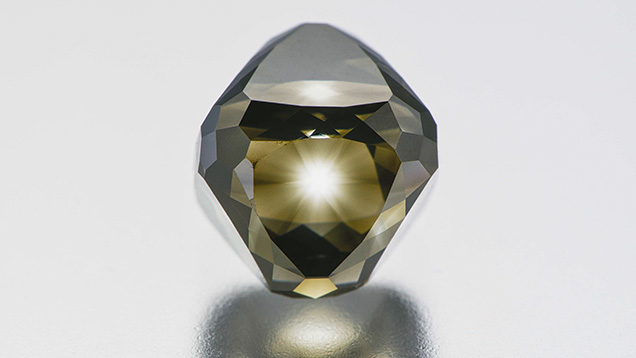The Rare Sun Diamond

While manufacturers typically seek to minimize or remove inclusions in gem-quality diamonds, a few are specifically cut to highlight these features. Certain hydrogen-rich diamonds can yield fascinating inclusion forms when faceted. One such stone is the 5.24 ct Rare Sun diamond (see above), which GIA’s New York laboratory recently had the opportunity to examine. Framed at the center of this Fancy Dark yellowish brown modified octahedron is an eye-visible cloud inclusion that scatters light to form the image of a star and its shining rays. The inclusion’s orientation gives it an unusually distinct six-fold symmetry, which is very rare. The overall shape of the Rare Sun diamond has been precisely polished so that as light touches various parts of its surface, a different ray beams through. Achieving this effect required extremely precise fashioning—even the slightest error in cutting or polishing would have diminished the effect.
Very few diamonds have the potential to display this star-like pattern, and fewer still ever have this potential recognized and achieved. Diamonds with unusual inclusions, especially inclusions that suggest the shape of other objects, are also prized by gem collectors and seekers of the uncommon. The Rare Sun diamond is a large and noteworthy example and could be considered among those unique diamonds.
This diamond, with its particularly distinctive inclusion scene, also serves as a valuable research material. Gemologists welcome the opportunity to study gems with such unusual features.



